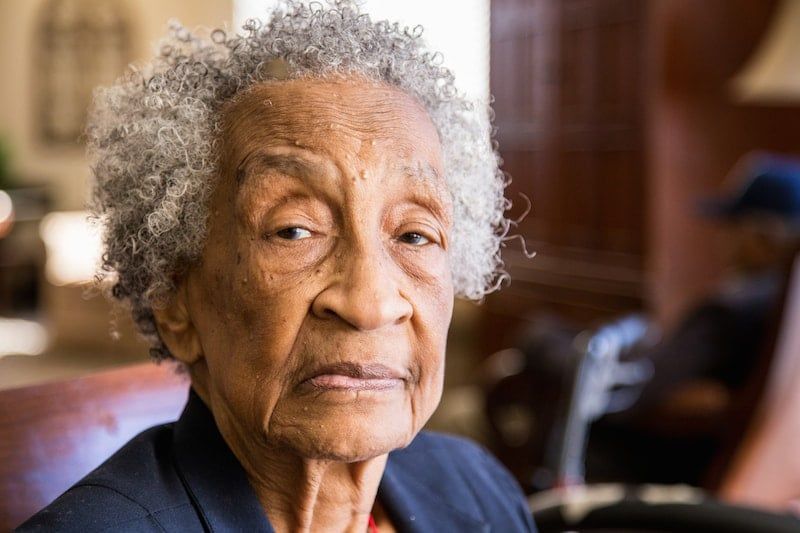Sundowners Syndrome: Causes and Coping Strategies For Caregivers
If you're managing care for someone with dementia, dealing with Sundowner's Syndrome can be the toughest part of your day. Seniorly breaks down the triggers and symptoms of sundowning, and provides tips on how to effectively manage the condition.

What is Sundown Syndrome?
Sundown or Sundowner’s Syndrome is an ailment that affects many older adults in the mid to late stages of Alzheimer’s Disease or dementia. It can cause feelings of confusion, agitation, and overwhelming sadness. Most patients experience the most troubling symptoms during the late afternoon, evening, and nighttime hours when the sun starts to set; hence the name “Sundowner’s Syndrome”. When these feelings are triggered, it's called “sundowning” or “sundown", and these sundown syndrome symptoms can be really confusing, frustrating and downright exhausting for everyone involved.
Some doctors believe that Sundowner’s Syndrome is a result of overwhelming sensory stimulation during the day, others suspect that hormonal imbalance is involved, while a third hypothesis suggests that Alzheimer’s disease affects the brain region important to normal day-night cycle. In any case, what we can say for sure is aside from the connection to Alzheimer's disease and dementia, the medical community has not achieved consensus on the exact causes.
We do know that disorders such as depression may worsen the symptoms of sundowning, leading to unbalanced emotional states that affect dementia patients, family members, and dementia caregivers alike. Fortunately, there are methods to deal with Sundowner’s symptoms and mitigate this stress.
What are Sundown Syndrome symptoms?
While sundowning occurs in the late afternoon or early evening, and the behavioral symptoms are usually easy to identify - especially if they are out of character for the patient. According to the Alzheimer's Association, sundowning behaviors can include a sense of restlessness, agitation, frustration, anger or increased confusion. Some may pace the room relentlessly while others may have sleep problems. For caregivers, the sundowning behaviors can be scary and frustrating, especially when they come at the end of a long day of balancing other roles and responsibilities.
What are the causes or triggers of sundowning behaviors?
Sundowning symptoms - most often associated with Alzheimer's disease or other forms of dementia - will present as the day progresses and particularly when the sun starts to go down. The timing of its occurrence depends on your loved one’s circadian rhythm; their internal body clock will determine when they will start to experience feelings of confusion or depression.
Generally, there are a few risk factors that can make sundowning worse:
- Fatigue and lack of sleep or other sleep disturbances
- Too much stimulation or activity later in the day
- Internal or hormonal imbalances
- Low light and heightened darkness in winter months
- Disorienting or new routines or otherwise stressful environments
How to manage sundowning symptoms
So how can you get help for Sundowner’s Syndrome? Managing sundowning syndrome involves special planning around the time of day, daily routines, and mood swings for those with Alzheimer’s or people with dementia. The trick is to remove triggers and conditions that worsen symptoms. While we can't prevent sundowning, research suggests that there are a few things we can do to manage sundowner’s symptoms:
- Reduce caffeine and alcohol: Avoid alcohol and caffeine intake after the evening meal, so that your elderly loved one is ready for sleep at night when the time comes.
- Improve sleep hygiene: Establishing a bedtime routine may also help alleviate symptoms by making your loved one feel more comfortable and calm in the evening time before they fall asleep. Focus on minimizing any kind of sleep disturbance or trouble sleeping.
- Provide light: Purchase a lightbox or a nightlight to keep your loved one’s room somewhat lit as the house gets dark. Having clear but soothing lighting can help reduce confusion associated with dementia and make your loved one feel safer in their bedroom when it’s dark.
- Offer comforting objects: You can try surrounding your loved ones with familiar objects before they fall asleep at night, whether these are favorite books or pictures, soothing music or a well-loved movie. These meaningful objects and experiences can help comfort your loved one through a difficult time and connect them to memories that can calm nerves and make them feel more secure.
- Limit stimulation in late afternoon and early evening: try to create a calming afternoon and evening ritual, limiting exposure to people, activities or other stimuli.
- Seek medical attention: If you are concerned about a loved one, and you are at a loss for how to deal with Sundowner’s symptoms, talk to a physician about possible underlying conditions that may be affecting sleep patterns and increasing agitation at night. Are there unmet physical needs that need addressing, such as diet, vision or hearing impairments? The National Institute on Aging also recommends doing a systematic review of medications with your loved one's doctor to ensure that prescriptions aren't a contributing factor.
The important thing to remember is that you while you can't "fix" Sundowners Syndrome, there are strategies to alleviate the anxiety and depression by providing a calm, predictable daily routine.
Commonly asked questions
When does sundowning occur?
As the name suggest, the onset of sundowners syndrome occur in the late afternoon and early evening hours.
At what stage of dementia does sundowning usually begin?
While every dementia patient will experience the progression of the disease differently, sundowner syndrome generally starts in middle stages and later stages of dementia, according to the Alzheimer's Association. About 20% Alzheimer's patients will experience sundowning.
Does Sundown Syndrome go away?
Generally speaking, it is not possible to "cure" Sundown Syndrome, but Sundowner's symptoms may come and go as caregivers learn how to manage the symptoms for their loved one. Also, as patients move through the different stages of dementia, sundowner's may be a less pervasive part of the overall presentation of the disease.
How do you cure Sundown Syndrome?
While we wish Sundowner's were curable, it's an all too common part of managing Alzheimer's disease and dementia. For tips on reducing the severity of Sundowning Syndrome, read above.
Where can I find resources for managing Sundown Syndrome?
See our list of dementia resources below, or visit our collection of trusted authorities for more info and tips for coping with Sundown Syndrome.
- National Institute on Aging: has information on scientific studies as well as resources for caregivers on managing Sundown Syndrome.
- Alzheimer's Association: has a helpful library organized by stages and behaviors.
- Mayo Clinic: has a good outline of best practices for sleep hygiene for dementia patients.
- Family Caregiver Alliance: is a wonderful resource for caregivers who need emotional support or guidance as they navigate caring for someone with dementia.
- Cleveland Clinic: has created a great overview of the differences between delirium and sundown symptoms, which may be helpful for caregivers trying to understand the difference between the two.
Marlena del Hierro earned her Master of Arts degree in Gerontology from San Francisco State University and her Bachelor of Arts degree in Human Development from California State University. She also serves in an advisory capacity for Jukebox Health. Marlena is a vocal advocate for evolving the aging paradigm, and is a frequent contributor to public discussions about aging. She has served as a resource for media outlets like WGBH, FOX News, CNBC and the Today Show.
To learn more about Seniorly's editorial guidelines, click here.
Sign up for our Healthy Aging Handbook
Seniorly’s Senior Living advisors created a comprehensive handbook to help people age happily while ensuring they love where they live. Enter your email address below to receive your copy and learn more about Healthy Aging and Senior Living.*
*By submitting your email address above, you consent to receive occasional email communications from Seniorly, including educational content and tips, newsletters, and other relevant updates and offerings. You can unsubscribe at any time and we will never sell or distribute your email address to a third party. You can view our Privacy Policy here.
